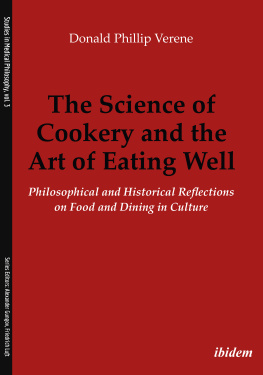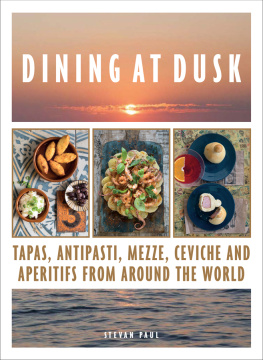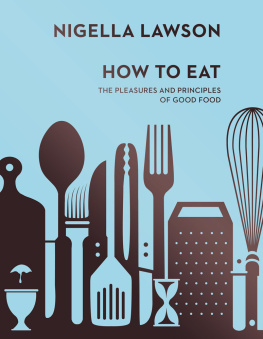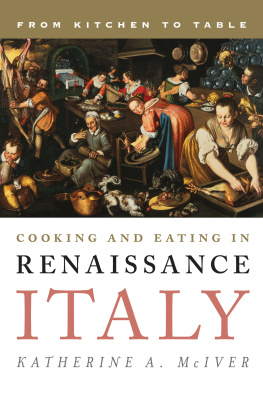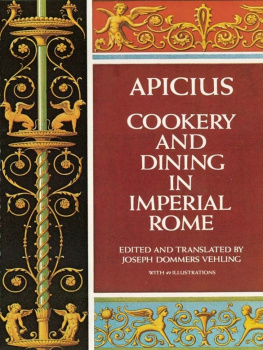ibidem Press, Stuttgart
Inhaltsverzeichnis
In memory of
Eleanor Grant Verene
whose recipes first formed my culinary world
A tavola non sinvecchia .
At table one does not grow old.
Preface
In the second chapter of Ecclesiastes, the wisdom of Solomon is: There is nothing better for mortals than to eat and drink, and find enjoyment in their toil. Two things distinctive to human culture are the development of language and the cooking of food. These two abilities come together in the art of dining. The meal unites food and conversation. The pleasures of the table and of table-talk go back as far as the poems of Homer.
The science of cookery and the art of eating well are not medicine, but they are allied with medicine from its earliest conception. Galen, in discussing the importance of nutrition in the Method of Medicine , says: In short, the chief point of nourishment is to let it be easily digested and nutritious (7.6). Medicine is directly concerned with the prevention and healing of disease. In its broader sense, it is concerned with the well-being of human beings. In this concern, cooking and eating well play a role. Proper nutrition is essential to the health of the body and the conviviality of the meal and the institution of dining is of great value for promoting the tranquility of the psyche.
The theme of this book is the importance of home cooking and how it depends upon and maintains tradition. The art of eating well is enhanced by a knowledge of ingredients and an awareness of the history of dining. Such knowledge gives context to the daily event of the meal, an event that is present in every culture and as old as culture itself. The art of dining, like the art of living of which it is a part, is a way to order the self and its place in the world.
Chapter 1 is a general view of cooking and dining, as begun by the ancient Greeks and Romans, and progressing to the famous text of Brillat-Savarin, The Physiology of Taste . Chapter 2 is an interpretation of Plutarchs Dinner of the Seven Wise Men , his imaginative account of the gathering at Delphi of the Seven Sages of Greece, at a dinner hosted by Periander, ruler of Corinth, whose conversation encompasses the nature of good government and the nature of the human soul. Chapter 3 is a condensation of the fifteen books of Athenaeuss treatise on the Learned Banqueters or Deipnosophists , a work which cites many other works, and which is itself frequently cited but rarely read. Chapter 4 discusses the two most famous cookbooks in Western culture: the Roman work of Apicius and the Florentine book of Artusi. Added to these are comments on some contemporary cookbooks, notably those of Giuliano Bugialli.
The theme of this book derives from my experience with and attachment to Italian cooking, acquired while living for extended periods in Florence over the past several decades. To shop at the Mercato Centrale at San Lorenzo is to confront a world of ingredients necessary to the Florentine table. When combined with the friendly conversations with its vendors, concerning the preparation of their wares, such shopping is a culinary education that no cookbook can supply. In Florentine cooking, as in Italian cooking generally, the quality of the ingredients, including their freshness, is the master key to the art of eating well.
It is only human to desire to eat well. But I find a more specific reason in the words of the great poet of the American language, author of the epic poem The People, Yes , Carl Sandburg, who was born and raised in the midwestern town of Galesburg, Illinoisas was I. Sandburg was asked what he wanted out of life. He replied, Three things, maybe four: to be out of jail, to eat regular, to get what I write printed. And a little love at home and a little outside. The fourth was his way of expressing his wish to receive some recognition for his work, but he knew what every writer knowsthat the recognition may not come. Thats why its important to eat regular.
Once again, I thank Molly Black Verene for her necessary and generous assistance in the preparation of the text.
Chapter 1
Introduction:
The Science of Cookery and the Art of Eating Well
Not only does cooking mark the
transition from nature to culture,
but through it and by means of it,
the human state can be defined with
all its attributes, even those that,
like mortality, might seem to be the
most unquestionably natural.
Claude Lvi-Strauss
The Raw and the Cooked
The First Meals
In the Protagoras , Plato relates the story of Prometheus and the acquisition of fire by humans (320d22d). There was a time when the gods existed but mortal beings did not. At the proper moment in the genesis of things, the gods molded the various forms of these beings inside the earth. They did this by blending earth and fire and various compounds. When the gods were ready to bring these beings into the world they put Prometheus and his brother Epimetheus in charge of assigning to each type its particular powers and abilities.
Epimetheus begged Prometheus to grant him the privilege of distributing these powers and abilities to the various species, and the agreement was made that, once the distribution was complete, Prometheus could inspect it. Thus allowed, Epimetheus supplied some with strength; those that were weaker he made quick. To some he assigned wings and to others the means to burrow underground. For protection against the weather he gave some thick pelts and hides. He shod some with hooves and gave others claws. He also provided them with various forms of nourishment. Each species was equipped with what was needed for its survival.
When Epimetheus (whose name means he who learns only from the event, the heedless) was finished, Prometheus (whose name means he who knows in advance, who provides), saw that all the available powers and abilities had been used up on the nonreasoning animals. The human race had been left entirely unequippednaked, unshod, and unarmedand it was already the day that all the animals, including the humans, were to be released from inside the earth into the light.
Prometheus, in order to provide the humans with some means of survival, stole fire for them from Hephaestus, the divine smith and master of the forge on Lemmos; from Athena he stole wisdom in the practical arts that was necessary for their use of fire. But he did not provide political wisdom, necessary for living together in society, for that was kept by Zeus. Humans were the only animals to command the divine power of fire and its use as a means for their existence. Also, they alone among the animals worshipped the gods.
Because human beings did not possess the art of politics, Zeus feared they might scatter and be destroyed, unable to form cities. He sent Hermes to distribute equally to all humans the virtue of justice, joined with the proper sense of shame. In Platos account, Zeus thus looks kindly on Prometheuss act. But in another version, given by Cicero in the Tusculan Disputations (2.10), Zeus is greatly displeased by Prometheuss theft of this possession of the gods. Cicero quotes from a lost play of Aeschylus in which Zeus (Jove) chains Prometheus to the Caucasus and causes an eagle (Joves bird) to swoop down and gnaw his liver. His liver grows back daily, only to be continually attacked for centuries, until Jove repeals the punishment.
Whether Zeus acts kindly toward Prometheuss theft for humanity or is furiously offended, the fact remains that human animals, unlike any of the others, possess the divine power of fire, sharing ownership of this element with the gods. Possession of fire allows the human race to do four things, in addition to using it for warmth and protection. First, as claimed by Giambattista Vico, the philosopher of history, humans could set fire to the great forests that cover the earth after the universal flood, in order to accomplish the heavy task of bringing their lands under cultivation and sowing them with grain, which roasted among the thorns and briers, they had perhaps discovered to be useful for human nourishment. In so doing, these giganti , these proto-farmers, accomplish a labor of Hercules and discover the connection of fire to food.

